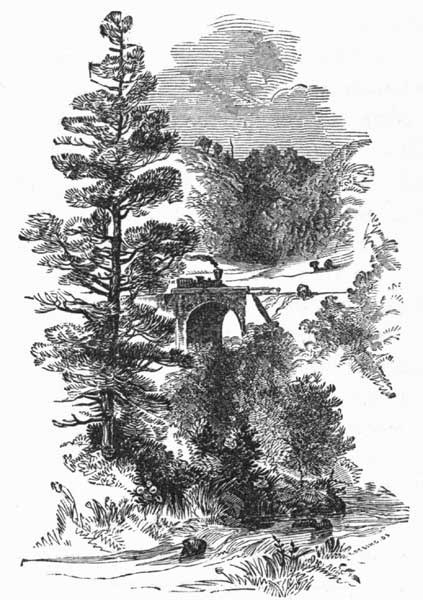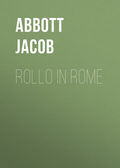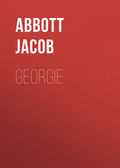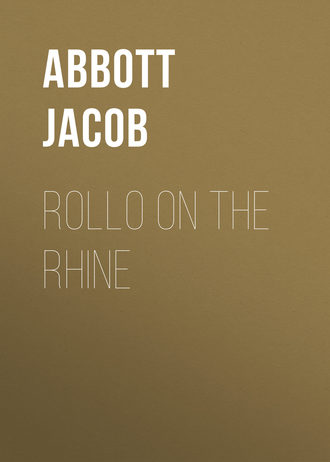
Abbott Jacob
Rollo on the Rhine
After gazing about upon this scene for a few minutes with great admiration and awe, Rollo called his uncle's attention to a discovery which he suddenly made.
"See," said he; "uncle George, there is a congregation."
So saying, Rollo pointed across the choir to a sort of gateway, which was opposite to the side on which they came in, and where, through the spaces which opened between the great columns that intervened, a congregation were seen assembled. They were in a chapel which was situated in that part of the church. The chapel itself was full, and a great many persons were seated in the various spaces rear. Mr. George and Rollo walked across the choir, and joined this congregation by taking a position near a pillar, where they could see what was going on.
At a corner near a little gateway in a railing, where the people appeared to come in, there was a woman sitting with a brush in her hand. The brush was wet with holy water. The people, as they came in,—for a few came in after Rollo and Mr. George arrived at the place,—touched their fingers to this brush, to wet them, and then crossed themselves with the holy water.
At the altar was a priest dressed in splendid pontificals. He was standing with his back to the people. There was a great number of immensely tall candlesticks on each side of him, and a great many other glittering emblems. The priest was dressed in garments richly embroidered with gold. There was a boy behind him dressed also in a very singular manner. The priest and the boy went through with a great variety of performances before the altar, none of which Rollo could at all understand. From time to time the boy would ring a little bell, and the organ and the choir of singers in the lofty gallery would begin to play and sing; and then, after a short time, the music would cease, and the priest and the boy would go on with their performances as before.
Presently Rollo heard a sound of marching along the paved floor, and looking into the choir whence the sounds proceeded, he saw a procession formed of boys, with a priest, bearing some glittering sacred utensils of silver in his hands, at the head of them. The boys were all dressed alike. The dress consisted of a long crimson robe with a white frock over it, which came down below the waist, and a crimson cape over the frock, which covered the shoulders. Thus they were red above and below, and white in the middle.
One of these boys had a censer in his hands, and another had a little bell; and as they came along you could see the censer swinging in the air, and the volumes of fragrant smoke rising from it, and you could hear the tinkling of the little bell. The priest advanced to the altar before which the audience were sitting, and there, while the censer was waving and the smoke was ascending, he performed various ceremonies which Rollo could not at all understand, but which seemed to interest the congregation very much, for they bowed continually, and crossed themselves, and seemed impressed with a very deep solemnity.
Presently, when the ceremony was completed, the procession returned into the choir, the priest at the head of it, just as it came.
When the procession had passed away, Mr. George made a sign for Rollo to follow him, and then walked along out through the gate where the woman was sitting with the holy water. She held out the brush to Mr. George and Rollo as they passed, but they did not take it.
"What ridiculous mummeries!" said Rollo, in a low tone, as soon as they had got out of the hearing of the congregation.
"Yes," said Mr. George, "they seem so to us; but I have a certain respect for all those ceremonies, since they are meant to be the worship of God."
"I thought it was the worship of images," said Rollo. "Did not you see the images?"
"Yes," said Mr. George, "I saw them; and perhaps we can make it out that those rites are, in reality, the worship of images; but they are not meant for that. They are meant for the worship of God."
Chapter III.
The Galleries
"I want to get up upon the towers," said Rollo, "if we can."
"Yes," said Mr. George, "but I want first to go and see the tomb of the three kings."
"What is that?" asked Rollo.
"I will show you," said Mr. George. So saying, Mr. George led the way, and Rollo followed, along what is called the ambulatory, which is a broad space that extends all around the head of the cross in the cathedral churches of Europe, between the screen of the choir on one side and the ranges of chapels on the other. The ambulatory is usually very grand and imposing in the effect which it produces on the mind of the visitor, on account of the immense columns which border it, the loftiness of the vaulted roof, which forms a sort of sky over it above, and by the elaborate carvings and sculptures of the screen on one side, and the gorgeous decorations of the chapels on the other. Then all along the floor there are sculptured monuments of ancient warriors armed to the teeth in marble representations of iron and steel, while the walls are adorned with rich paintings of immense magnitude, representing scenes in the life of the Savior. There seemed to Mr. George some incongruity between the reverence evinced for the teachings and example of Jesus, in the pictures above, and the honor paid to the barbarous valor of the fighting old barons, in the monuments and effigies which occupied the pavement below.
At length, at the head of the cross, exactly opposite to the centre of the high altar, which faced the choir, in the place which seemed to be the special place of honor, Mr. George pointed to a small, square enclosure, or sort of projecting closet, which was richly carved and gilded, and adorned with a variety of ancient inscriptions.
"There," said Mr. George, "that must be the tomb of the three kings. That is the sepulchre which contains, as they pretend, the skulls of the three wise men of the east, who came to Bethlehem to worship Jesus the night on which he was born."
"How came they here?" asked Rollo.
"They were at Milan about six or eight hundred years ago," said Mr. George, "and they were plundered from the church there by a great general, and given to the Archbishop of Cologne, and he put them in this church. They have been here ever since, and they are prized very highly indeed. They are set round with gold and precious stones, and have the names of the men marked on them in letters formed of rubies."
"Can we see them?" asked Rollo. As he said this he climbed up upon a little step, and attempted to look through a gilded grating in the front of the coffer which contained the rubies.
"Yes," said Mr. George, "but we must pay the sacristan for showing them to us. We can ask him about them when we come down from the galleries."
"And besides," continued Mr. George, "the guide book says that under the floor of the church, just in front of the tomb of the three kings, the heart of Mary de Medicis is buried. That must be the place."
So saying, Mr. George pointed to a large, square flagstone, which looked somewhat different from the others around it. Rollo gazed a moment at the stone, and then said,—
"I suppose so; but I don't care much about these things, uncle George. Let us go up into the towers."
"Very well," said Mr. George, "we will go and see if we can find the way."
So our travellers went on along the ambulatory, and thence into the aisles and nave of the church, stopping, however, every few minutes to gaze at some gorgeously decorated altar, or large and beautiful painting, or quaint old effigy, or at some monument, or inscription, or antique and time-worn sculpture. There were a great many other parties of visitors, consisting of ladies and gentlemen, and sometimes children, rambling about the church at the same time. Rollo observed, as he passed these groups, that some were talking French, some German, and some English. Here and there, too, Rollo passed plain-looking people, dressed like peasants, who were kneeling before some altar or crucifix, saying their prayers or counting their beads, and wearing a very devout and solemn air. Some of these persons took no notice of Mr. George and Rollo as they passed them; but others would follow them with their eyes, scrutinizing their dress and appearance very closely until they got by, though they continued all the time to move their lips and utter inarticulate murmurings.
"I don't think those girls are attending much to their prayers," said Rollo.
"I'm afraid the girls in the Protestant churches in America do not attend to them much better," said Mr. George. "There is a great deal of time spent in seeing how people are dressed by worshippers in other churches than the Roman Catholic."
At length Rollo caught a view of the man who had held the plate for a contribution, at the time when he and Mr. George came in at the church door. He was walking to and fro, with his plate in his hand, in a distant portion of the church. Rollo immediately offered to go to him, and ask how he and Mr. George were to get to the towers. So he left Mr. George looking at a great painting, and walked off in that direction.
Just before Rollo came to the man, his attention was attracted by a girl of about twelve or thirteen years of age, who was strolling about the church at a little distance before him, swinging her bonnet in her hand. She was very pretty, and her dark eyes shone with a very brilliant, but somewhat roguish expression. She stopped when she saw Rollo coming, and eyed him with a mingled look of curiosity and pleasure.
Rollo, observing that this young lady appeared not to be particularly afraid of him, thought he would accost her.
"Do you speak French?" said he in French, as he was walking slowly by her. He supposed from her appearance that she was a French girl, and so he spoke to her in that language.
The girl replied, not in French, but in English,—
"Yes, and English too."
"How did you know that I spoke English?" said Rollo, speaking now in English himself.
"By your looks," said the girl.
"What is your name?" asked Rollo.
"Tell me your name first," said the girl.
"My name is Rollo," said Rollo.
"And mine," replied the stranger, "is Minnie."
"Do you see that man out there," said Minnie, immediately after telling her name, "who is gathering the donations? Come and see what a play I will play him."
Minnie was a French girl, and so, though she had learned English, she did not speak it quite according to the established usage.
So she walked along towards the contribution man, wearing a very grave and demure expression of countenance as she went. Rollo kept by her side. As soon as they came near, the man held out his plate, hoping to receive a contribution from them. But as the plate already contained money which had been put in by former contributors, the action was precisely as if the man were offering money to the children, instead of asking it of them. So Minnie put forth her hand, and making a courtesy, took one of the pieces of money that were in the plate, pretending to suppose that the man meant to give it to her, and said at the same time, in French,—
"I am very much obliged to you, sir. It is just what I wanted."
The man immediately exclaimed, "Nein nein!" which is the German for No! no! and then went on saying something in a very earnest tone, and holding out his hand for Minnie to give him back the money. Minnie did so, and then, looking up at Rollo with a very arch and roguish expression of countenance, she turned round and skipped away over the stone pavement, until she was lost from view behind an enormous column. Rollo saw her afterwards walking about with a gentleman and lady, the party to which she belonged.
Rollo then asked the man who held the plate what he should do to get up into the towers. He asked this question in French, and the man replied in French that he must go "to the Swiss, and the Swiss would give him a ticket.
"Where shall I find the Swiss?" asked Rollo.
The man pointed to a distant part of the church, where a number of people were going in through a great iron gateway.
"You will find him there somewhere," said the man, "and you will know him by his red dress."
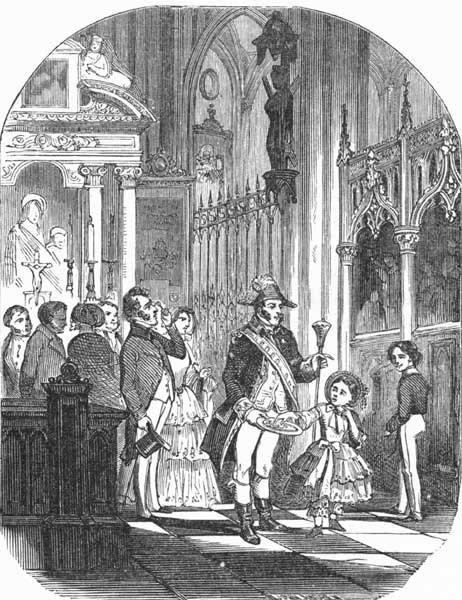
MINNIE'S ROGUERY.
So Rollo went and reported to his uncle George, and they together went in pursuit of the Swiss. They soon came to the great gate; and just inside of it they saw a man dressed in a long red gown which came down to his ankles. This proved to be what they called the Swiss. On making known to him what they wanted, this man gave them a ticket,—they paying him the usual fee for it,—and then went and found a guide who was to show them up into the galleries.
The guide, taking them under his charge, led them outside the church, and then conducted them to a door leading into a small round tower, which was built at an angle of the wall. This tower, though small in size, was as high as the church, and it contained a spiral staircase of stone, which conducted up into the upper parts of the edifice. Mr. George and Rollo, however, found that they could not go up to the towers but only to what were called the galleries. But it proved in the end that they had quite enough of climbing and of walking along upon dizzy heights, in visiting these galleries, and Rollo was very willing to come down again when he had walked round the upper one of them, without ascending to the towers.
There were three of these galleries. The first was an inner one; that is, it was inside the church. The two others were outside. The party was obliged to ascend to a vast height before they reached the first gallery. This gallery was a very narrow passage, barely wide enough for one person to walk in, which extended all around the choir, with a solid wall on one side, and arches through which they could look down into the church below on the other. After walking along for several hundred feet, listening to the swelling sounds of the music, which, coming from the organ and choir below, echoed grandly and solemnly among the vaults and arches above them, until they reached the centre of the curve at the head of the cross, Mr. George and Rollo stopped, and leaned over the stone parapet, and looked down. The parapet was very high and very thick, and Rollo had to climb up a little upon it before he could see over.
They gazed for a few minutes in silence, completely overwhelmed with the dizzy grandeur of the view. It is always impossible to convey by words any idea of the impression produced upon the mind by looking down from any great height upon scenes of magnificence or of beauty; but it would be doubly impossible in such a case as this. Far below them in front, they could see the choir of singers in the singing gallery, with the organ behind them. The distance was, however, so great that they could not distinguish the faces of the singers, or even their persons. Then at a vast distance, lower still, was the floor of the choir, paved beautifully in mosaic, and with little dots of men and women, slowly creeping, like insects, over the surface of it. At a distance, through the spaces between the columns, a part of the congregation could be seen, with the women and children at the margin of it, kneeling on the praying chairs, and a little red spot near a gate, which Rollo thought must be the Swiss. The whole of the interior of the choir, which they looked down into as you would look down into a valley from the summit of a mountain, was so magnificently decorated with paintings, mosaics, and frescoes, and enriched with columns, monuments, sculptures, and carvings, and there were, moreover, so many railings, and screens, and stalls, and canopies, and altars, to serve as furnishing for the vast interior, that the whole view presented the appearance of a scene of enchantment.
Mr. George said it was the most imposing spectacle that he ever saw.
After this, the guide led our two travellers up about a hundred feet higher still, till they came to the first outer gallery; and the scene which presented itself to view here would be still more difficult to describe than the other. The gallery was very narrow, like the one within, and it led through a perfect maze of columns, pinnacles, arches, turrets, flying buttresses, and other constructions pertaining to the exterior architecture of the church. It was like walking on a mountain in the midst of a forest of stone. The analogy was increased by the monstrous forms of bears, lions, tigers, boars, and other wild and ferocious beasts, which projected from the eaves every where to convey the water that came down from rains, out to a distance from the walls of the building. These images had deep grooves cut along their backs for the water to flow in. These grooves led to the mouths of the animals, and they were invisible to persons looking up from below, so that to observers on the ground each animal appeared perfect in his form, and was seen stretching out the whole length of his body from the cornices of the building, and pouring out the water from his mouth.
From these outer galleries Rollo could not only see the pinnacles, and turrets, and flying buttresses, of the part of the church which was finished, but he could also observe the immense works of scaffolding and machinery erected around the part which was now in progress. Men were at work hoisting up immense stones, and moving them along by a railway to the places on the walls where they were destined to go. The yard, too, on one side, far, far down, was covered with blocks, some rough, and others already carved and sculptured, and ready to go up. The towers were in view too, with the monstrous crane leaning over from the summit of one of them; but there seemed to be no way of getting to them but by crossing long scaffoldings where the masons were now at work. This Rollo would have had no wish to do, even if the guide had proposed to conduct him.
So, after spending half an hour in surveying the magnificent prospect which opened every where around them over the surrounding country, and in scrutinizing the details of the architecture near, the sculptures, the masonry, the painted windows, the massive piers, and the buttresses hanging by magic, as it were, in the air, and all the other wonders of the maze of architectural constructions which surrounded them, the party began their descent.
"I am glad they are going to finish it," said Rollo to Mr. George, as they were walking round and round, and round and round, in the little turret, going down the stairs. "The next time we come here, perhaps, it will be done."
"They expect it will take twenty years to finish it," said Mr. George.
"Twenty years!" repeated Rollo, surprised.
"Yes," said Mr. George, "and about four millions of dollars. Why, when they first determined that they would attempt to finish it, it took fifteen years to make the repairs which were necessary in the old work, before they could begin any of the new. And now, at the rate that they are going on, it will take twenty years to finish it. For my part, I do not know whether we ought to be glad to have it finished or not, on account of the immense cost. It seems as if that money could be better expended."
"Perhaps it could," said Rollo. "But every body that comes here to see it gets a great deal of pleasure; and as an immense number of people will come, I think the amount of the pleasure will be very great in all."
"That is true," said Mr. George, "and that is the right way to consider it; but let us make the calculation in the same way that we made the calculation about the gold chain that you were going to buy in London. If we suppose that the church was half done when they left off the work, and that it will now cost four millions of dollars to finish it, that will make eight millions of dollars in all. Now, what is the interest of eight millions of dollars, say at three per cent.?"
Rollo began to calculate it in his mind; but before he had got through, Mr. George said that it was two hundred and forty thousand dollars a year.
"That," said Mr. George, "is equal, with a proper allowance for repairs, to, say a thousand dollars per day. Now, do you think that the people who will come here to see it will get pleasure enough from it to amount in all to a thousand dollars a day?"
"I don't know," said Rollo, doubtfully. "I'd give one dollar, I know, to see it."
"Yes," said Mr. George, "so would I; and I do not know but that there would be three hundred thousand to come in a year, including all the great occasions that would bring out immense assemblages from all the surrounding country."
"At any rate, I hope they will finish it," said Rollo.
"So do I," said Mr. George.
"And I mean to put a little in the man's plate when I go down," said Rollo, "and then I shall have a share in it."
"I will too," said Mr. George.
Accordingly, as they passed by the man when they were leaving the church, Mr. George put a franc into his plate, and Rollo half a franc. Just at the time that they put their money in, the party that Minnie belonged to came by, and the gentleman put in a silver coin called a thaler, which is worth about seventy-five cents; so that Rollo had the satisfaction of seeing that one of the four millions of dollars was raised on the spot.
